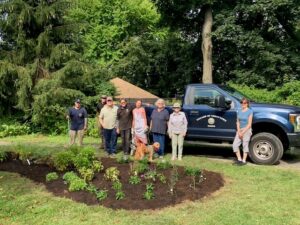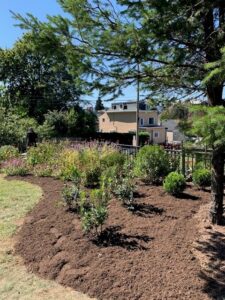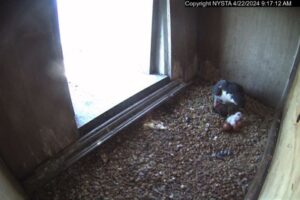
Well-tended gardens flourish in maturity, and the same is true of garden clubs. The Little Gardens of Tarrytown, now celebrating 100 years of horticultural contributions to the local community, is living proof.
Founded in 1924 by Emma Davis, the club took little time establishing its name. At the second meeting, on April 27, the minutes record, the all-female membership discussed several admirable options: The blue rose club – The weedless club – Garden of Eves – Garden Lovers Club – Better Gardens Home Gardens – Little Garden Club. Mrs Ralph Todd eventually moved that the club be called Little Gardens of… and the rest is history.
It began life participating in flower shows and civic improvement, winning awards for miniature rock gardens and floral arrangements, and publicly advocating on village planning issues concerning parking and congestion.
Early on, its members also expended much energy tending trees, hanging baskets and plants at Tarrytown’s train station, and watering plants at Phelps Hospital, but as circumstances shifted, so the club was freed up to reorient itself. As the new millennium opened, two members in particular – Carolyn Swenson, involved in the master gardening classes at the New York Botanical Gardens, and Maribeth Bischof, interested in improving the environment through plantings – spearheaded the club’s development of a native garden in Neperan Park.

This shift proved to be prescient. Over recent years, garden clubs nationwide have begun throwing their considerable weight behind pollinator plantings and phasing out pesticides. The Little Gardens proved to be well ahead of the times, taking advantage of the Village of Tarrytown’s decision to step in and make a park where development had been planned, and using grant money to establish a native plant garden on part of the site in 2007. Since expanded, the space includes pollinators, a rain garden, and a bird bath, and has become a village favorite.
“Our longevity is a testament to rolling with the times,” says Kim Waddell, president since 2014. “The current focus on native plants, pollinators and bird friendly practices connects us with other groups within Westchester County focused on environmentally friendly work.”
The club is also conscious of the need to develop its base of volunteers. “The beauty of our club is that it is truly focused on ‘common ground’,” comments Co-Vice-President Monique Kozlowski. “Our membership includes immigrants, different faith traditions, and a spectrum of political persuasions, but we are bound by a love for our community, and a desire to bring awareness to the importance of the natural environment.”
Club activities also include visits to public gardens and flower shows, and monthly meetings which usually offer a speaker, sharing advice on topics such as apples, soil, pruning and what you should (or should not) be doing in the fall. It has also participated in talks at the Warner Library: “The broader the topic appeal (e.g. global warming), the higher the attendance,” observes Waddell.
The centenary is being celebrated with an exhibit which opened on March 19 and runs until May 4, on Thursdays and Saturdays, from 2 to 4.30, at the Historical Society, 1 Grove St., Tarrytown. It’s arranged thematically and follows the club’s mission statement as a framework, which embraces the science and art of horticulture, co-operative garden work, protection of the environment, and village beautification.
You can meet the club at its Earth Day clean-up, on April 20 at Neperan Park, and enjoy celebratory cake and ice cream there that same afternoon. On April 26, there will be a plaque unveiling at Patriots Park.
And beyond that? “We will continue to focus on Neperan and Patriots Park, building stronger partnerships with youth groups, girl and boy scouts and other volunteers,” says Waddell, “having some fun, being outdoors, gardening and promoting the health benefits of gardening and more sustainable practices to the public.” What could be better?
.






